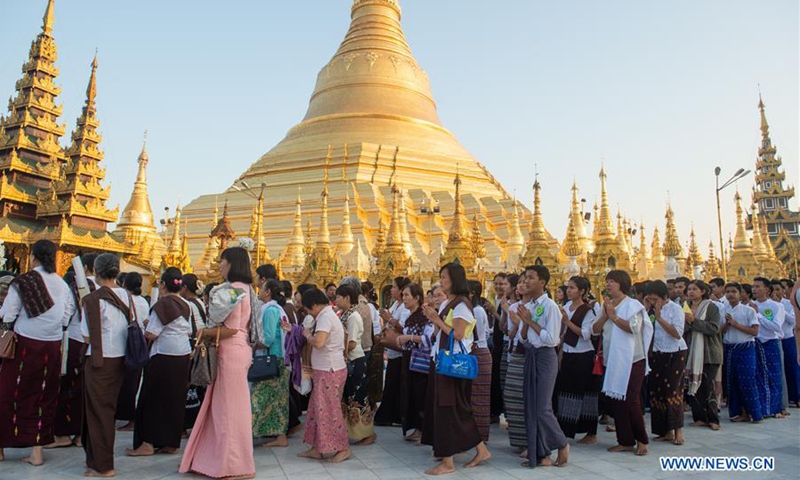Western NGOs in Southeast Asia support anti-China campaigns
By GT staff reporters Source: Global Times Published: 2020/9/22 2:20:38

People visit the Shwedagon Pagoda in Yangon, Myanmar, Jan. 11, 2020. Photo: Xinhua
Southeast Asian countries have long been the focus for Western NGOs and many work hard to support women's rights and aid the underprivileged. But critics increasingly argue that some non-governmental organizations have become vehicles for Western propaganda and even engage in "China-bashing campaigns" that are far outside their purview of doing public good.
Many Western NGOs have been rooted in the local societies in Southeast Asia countries for many years. They are normally most visible during local social or environmental crises, but have also been seen participating in local protests against China, debasing their self-proclaimed "politically-neutral" tag.
"NGOs staff cover a very wide range of causes, but they also play a role in discrediting China-aided or invested infrastructure projects by releasing reports that are not always written by accredit scholars or researchers," a Chinese surnamed Zhao living in Naypyitaw, capital of Myanmar, told the Global Times.
"Some of them even openly and bluntly support activities that aim to split China's sovereignty," said Zhao, saying that his neighbor had received a questionnaire from a local UK-funded NGO seeking peoples' 'complaints' about a nearby Chinese-aided renovation project.
There are other examples of US organizations stirring up troubles for projects between China and Southeast Asian countries. The infamous National Endowment for Democracy (NED), a foundation founded in 1983 under the Reagan administration to "support democracy in other countries," has been found to have frequently funded and egged on some NGOs in Myanmar that oppose China-invested development projects.
China announced sanctions on a batch of US NGOs including NED in December 2019, as some NGOs have even pushed for regime change, created global turmoil and cooperating with the US government and other anti-China forces to contain China.
Global observers have repeatedly exposed Shwe Gas Movement, a NED-sponsored NGO in Myanmar which has been active in attacking Chinese-Myanmar cooperative developments including a crude oil and gas pipeline project.
Geopolitical researcher Tony Cartalucci criticized the group for claiming pipeline equipment had "disturbed local religious area." The equipment had done anything "more or less extraordinary than one would find surrounding any large scale infrastructure project," Cartalucci wrote in his 2015 article Warning: Find Out Who Is Behind Civil Society Groups.
"In many cases, [Western] funding and organizing opposition groups to take to the streets and physically stop ongoing [development] projects," Cartalucci wrote. "...so that they may be reserved instead for the West's corporate giants to plunder them."
NED's website shows it has granted some $1.25 million to several Myanmar's local NGOs in at least 20 projects against foreign "resource extraction." Ironically, NED claims to support "human rights" and "democracy" in Myanmar but it still calls the country "Burma" on its website - an outdated name given by British colonists before its independence in 1948. In 1989 the country changed its name to Myanmar.
Western NGOs in Southeast Asia, sometimes derived from the same funding institutions, share sources and normally back each other to consolidate their voice against China, Xia Qian (pseudonym), a Chinese who conducts fieldtrip research in Nepal and is close to some of Western-supported NGOs, told the Global Times.
"When it comes to particularly sensitive issues, those Western NGOs often work with locally registered NGOs, providing financial support behind the scenes and recruiting local media and individual web bloggers to shout for them," Xia said. "Local NGOs working with them will also be screened based on their political stance and their relationship and interaction history with China."
Under the guise of protecting "human rights" and "democracy," some US NGOs, supported by US politicians and US intelligence agencies, ignore China's development record and fabricate stories about China ethnicity issues especially around the Nepalese border villages adjacent to China, according to Xia. "Some even collect information on the border using drones."
Among Southeast Asian countries, Myanmar, where the political situation has been in turmoil for years, has become a "paradise" for various Western NGOs, observers said.
Many NGOs, especially those from Western countries, entered Southeast Asia region in the 1990s, Zhu Zhenming, a professor at the Yunnan Academy of Social Sciences, told the Global Times.
The NGOs in Myanmar sprung up after the country carried out democratic reforms in 2010. NGOs from the US, Canada, Japan and many European countries brought money and resource to fill in social development gaps and promote green issues, Zhu explained.
The Philippines, a former colony of the US, also has been a preferred destination of some Western NGOs.
They usually use various tools to criticize China including stirring public anger among local residents to reject China-initiated projects due to "environmental concerns."
Opposition from some northern Thailand residents against Chinese hydropower stations at the Lancang River located in Southwest China's Yunnan Province is another typical case.
Local villagers hadn't received a clear scientific understanding of the landscape and the value of dams upstream, and thereby blindly believed some NGO's groundless allegations and protested along the river. Some even received subsidies for participating in protests, according to Zhu.
While many NGOs create value for local society and bring tangible assistance to local people, experts warn that politically-charged organizations controlled by outside powers are aimed at smearing and containing China.
Posted in: CENTRAL & SOUTH ASIA